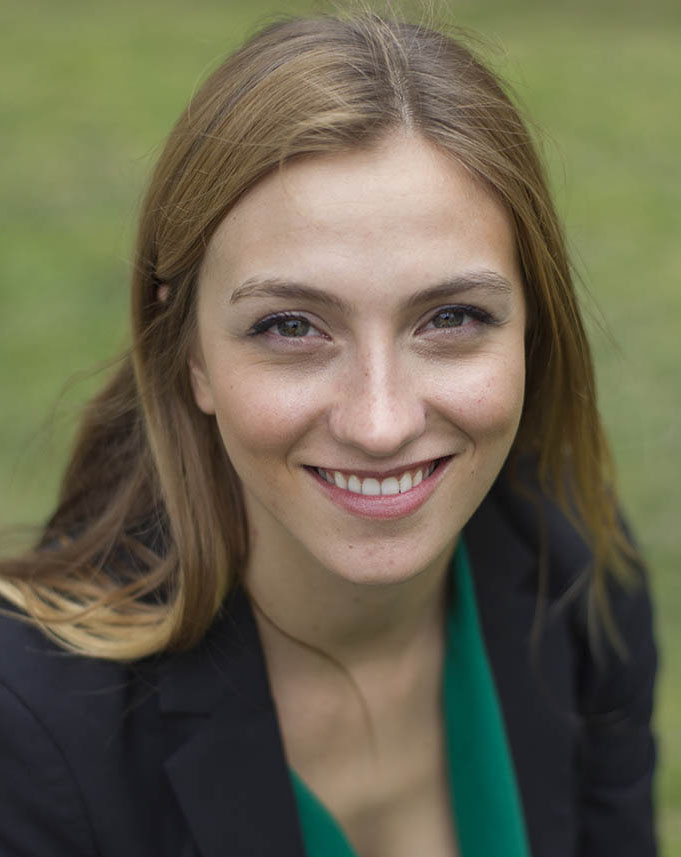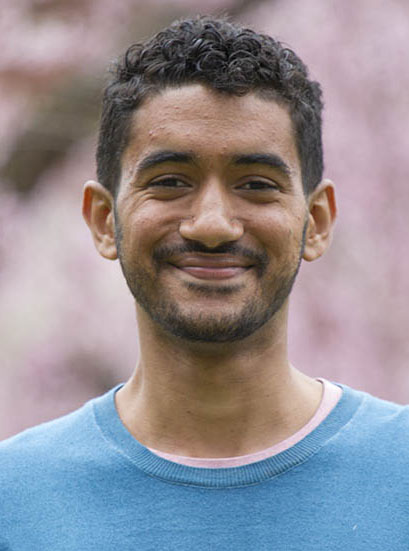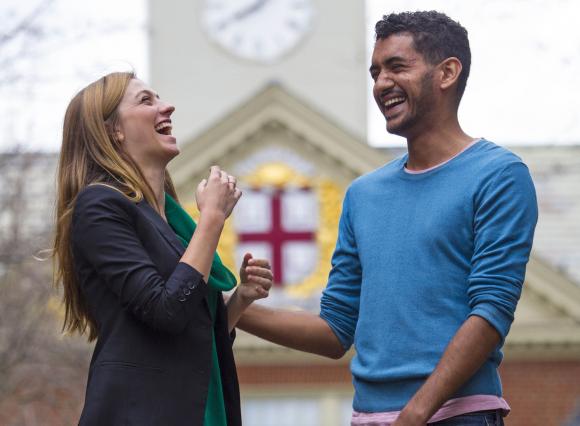PROVIDENCE, R.I. [Brown University] — Though they are at the very beginning — indeed the commencement — of their careers, senior orators Michelle Bailhe and Lucas Johnson have already worked hard in the community toward their shared goals of reducing social inequality. When they take to Brown’s biggest stage early Sunday afternoon, May 24, 2015, they will speak from experience.
In her four years at Brown, Bailhe did not shy away when her professors challenged her to act on the inspiration she gained in courses such as Introduction to Public Health (for which she remained a TA for three more years). She has embraced the opportunities, for example by doing research for two years in Rhode Island’s prison system with Dr. Jennifer Clarke, associate professor medicine and ob/gyn and director of health disparities research at the Memorial Hospital. Bailhe’s senior thesis is about how incarceration affects women’s health and family planning goals.

“I Don’t Know”
“One of the most inspiring aspects of my research has been finding the myriad ways recently incarcerated women provide support and wisdom for other women dealing with similar circumstances,” said Bailhe, a human biology concentrator focused on health disparities. Last year, she won a Liman Fellowship to also work on policy and legal issues of health inequality in New York.
In interviews for her thesis research, Bailhe said, “One woman spoke of giving her daughter’s baby blanket to another family whose baby was younger and needed it more. Other women offered each other advice on how to navigate barriers to health care. I believe their knowledge has tremendous potential to guide strategies to reduce health inequality.”
Johnson, too, spent many of his days at Brown away from Brown, learning by doing. An education studies concentrator, he taught and tutored in schools including Fox Point Elementary, DelSesto Middle School, and Hope High School. He came to Brown from a huge, successful public high school in Brooklyn, but when he began tutoring at age 15 he became acutely aware that around the city many other kids were mired in underperforming schools.

“School Spirit”
At Brown he became determined to learn more about such social ills. Over the course of his studies, he said, he grew to take a critical look at the structural inequalities of the U.S. education system, but at the same time came to appreciate how important it is to work in the classroom. Instead of going directly into policy, he wanted first to teach.
Taking the podium
It’s with a deep sense of the value of education, then, that Johnson will deliver an oration titled “School Spirit.” The phrase connotes pep rallies and lettered apparel (he confesses to buying a Brown hoodie upon acceptance to the University and wearing it almost nonstop for months), but he will trace how that has changed throughout his time at Brown. His four-year tenure has been marked by his work in the schools, his studies, his service as a Brown tour guide, and through involvement in Brown’s Organization of Multiracial and Biracial Students, but also by his observations about the sometimes-contentious dialogues on campus. School spirit, in other words, becomes shaped by experience.
“It becomes more nuanced, more critical, and more contextualized,” he said.
Bailhe will share a different wisdom, similarly forged by her intellectual, personal and cultural activities at Brown (she’s also a dancer with the Impulse Dance Company and led a Marriage Equality March in sophomore year). In her oration, titled “I Don’t Know,” she said she’ll talk about the power of relentless questioning.
“Brown has shown us the immense value of questioning ourselves, our knowledge, our beliefs, our biases, our goals, our ‘self-evident truths,’ even when it’s uncomfortable,” she said.
New graduates
After a summer of travel, Bailhe’s adventurous, questioning nature will carry through to her new job at McKinsey & Company. There she will work on public sector and health care consulting, where she hopes to put her education in health policy further into practice. One of her interviewers, she recalled, said, “This ends up being a really good place for people who leave Brown because it’s a really good place for restless intellects.”
Johnson will return to Brown this summer to pursue a master’s degree in teaching. He plans to teach high school English and to use that experience to inform his trajectory as a school reform advocate. As an undergraduate, his concentration in the field followed the history and policy track. Now he will extend those studies in a place where he already feels a deep and well-examined sense of school spirit.
“It’s kind of funny giving this big speech knowing that weeks later I’m coming right back,” he said, “but it goes to show that I like Brown enough to choose it twice.”

